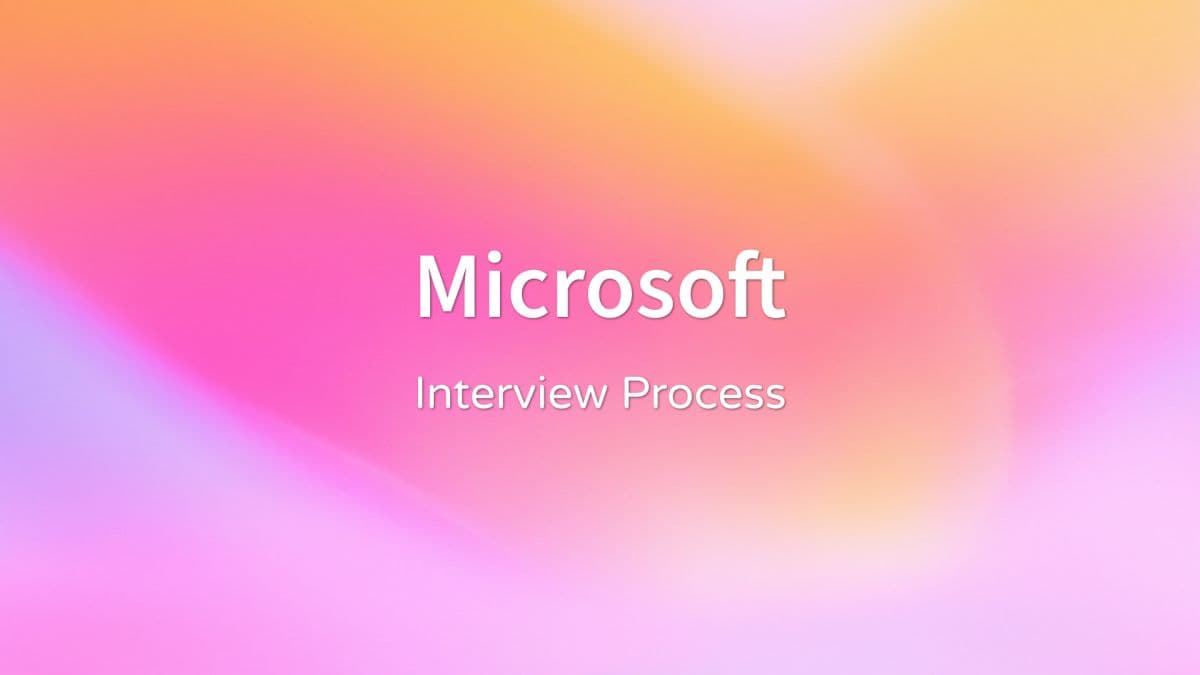Microsoft's Interview Process (2026)
Blog / Microsoft's Interview Process (2026)

The Microsoft interview process is a structured big tech hiring pipeline designed to evaluate technical expertise, problem-solving, and cultural fit. It typically unfolds as follows:To prepare effectively, focus your study plan on three core areas:1. Data Structures & Algorithms (DSA)Microsoft places a strong emphasis on coding and problem-solving, often through LeetCode-style questions. Study the most frequently asked problems, prioritizing medium and hard difficulty levels. 2. System DesignSystem design at Microsoft often ties to their product ecosystem - think designing a feature for Azure, Teams, or Windows. Common standalone questions include file sharing services or notification services.Interviewers value a collaborative approach, so treat the discussion like a conversation rather than a monologue.To prepare, practice designing systems and explaining your reasoning using our AI System Design Whiteboard, and review key principles in our System Design Fundamentals section to strengthen your foundational knowledge.3. Behavioural questionsMicrosoft’s behavioral interviews evaluate how well you align with their culture, focusing on growth mindset, collaboration, and impact. Questions generally fall into three key themes:Use the STAR method (Situation, Task, Action, Result) to structure your answers clearly and concisely. You can also practice with our Behavioral Course, which provides guidance, example questions, and tips for articulating your experiences effectively.ConclusionWe’ve already compiled the most frequently asked questions across all three categories and provided detailed solutions for each. Reviewing these materials will help you prepare efficiently, focus your efforts, and build the confidence needed to excel in your interviews. For a structured, step-by-step approach to every stage of the Microsoft interview process, follow our Microsoft Interview Roadmap, which guides you from preparation to offer.
- Resume Screening: An initial review of your background, experience, and qualifications to assess fit for the role.
- Recruiter Call: A conversation with a recruiter to discuss your experience, motivation, and alignment with Microsoft’s values and culture.
- Online Assessment (OA): Typically includes 2-3 LeetCode-style DSA questions designed to evaluate problem-solving skills, coding efficiency, and algorithmic thinking.
- Technical Interviews: Usually 4-5 rounds covering data structures and algorithms, system design, and occasionally domain-specific questions. These interviews assess both technical ability and how you approach complex problems and communicate solutions.
- Decision: Final evaluation emphasizes technical performance as well as alignment with Microsoft’s culture, values, and collaborative expectations.
- Data Structures & Algorithms (DSA)
- System Design
- Behavioural questions
- Prioritize topics like arrays, trees, graphs, and dynamic programming - favorites in Microsoft interviews.
- Speed matters, but clarity is key: aim to solve problems in 25-30 minutes while explaining your logic concisely.
- Optimization isn’t always required, but be ready to discuss trade-offs and alternative approaches.
- Expect a focus on scalability, performance, and practical trade-offs.
- Core concepts to master include API design, caching, distributed databases, and cloud infrastructure (bonus points for familiarity with Azure).
- Growth & Adaptability (e.g., “Tell me about a time you learned a new skill to solve a problem”)
- Collaboration (e.g., “Describe a time you worked with a challenging teammate to deliver a project”)
- Impact & Initiative (e.g., “Give an example of when you went above and beyond to improve something”)
About TechPrep
You shouldn't have to struggle with interview anxiety. TechPrep empowers software engineers to stop guessing and start getting offers. We provide the exact, curated roadmap you need to master Data Structures, System Design, and Practical coding rounds. Join thousands of engineers who have turned rejections into dream jobs at top tech companies.